Legal Assignment: Agency, Corporate Law, and Fiduciary Duties Analysis
VerifiedAdded on 2020/03/16
|8
|1630
|271
Report
AI Summary
This legal assignment delves into the complexities of agency law, focusing on the roles and responsibilities of agents and principals within a corporate context. The analysis centers on a scenario involving 'Glasshouse Enterprises' and its directors, Lena and Rowan, along with an employee, Cole. The assignment examines the agency relationships between these individuals, exploring concepts such as actual and ostensible authority, fiduciary duties, and corporate liability for the actions of its agents. It evaluates the implications of contracts entered into by agents, considering whether the principal (the company) is bound by such contracts. The assignment also addresses breaches of duty, specifically focusing on instances where an agent acts outside their authority or engages in activities that conflict with the company's interests. Through case analysis and application of relevant legal principles, the assignment provides a comprehensive understanding of agency law and its practical implications in business operations. The assignment also includes a reference list of legal sources.
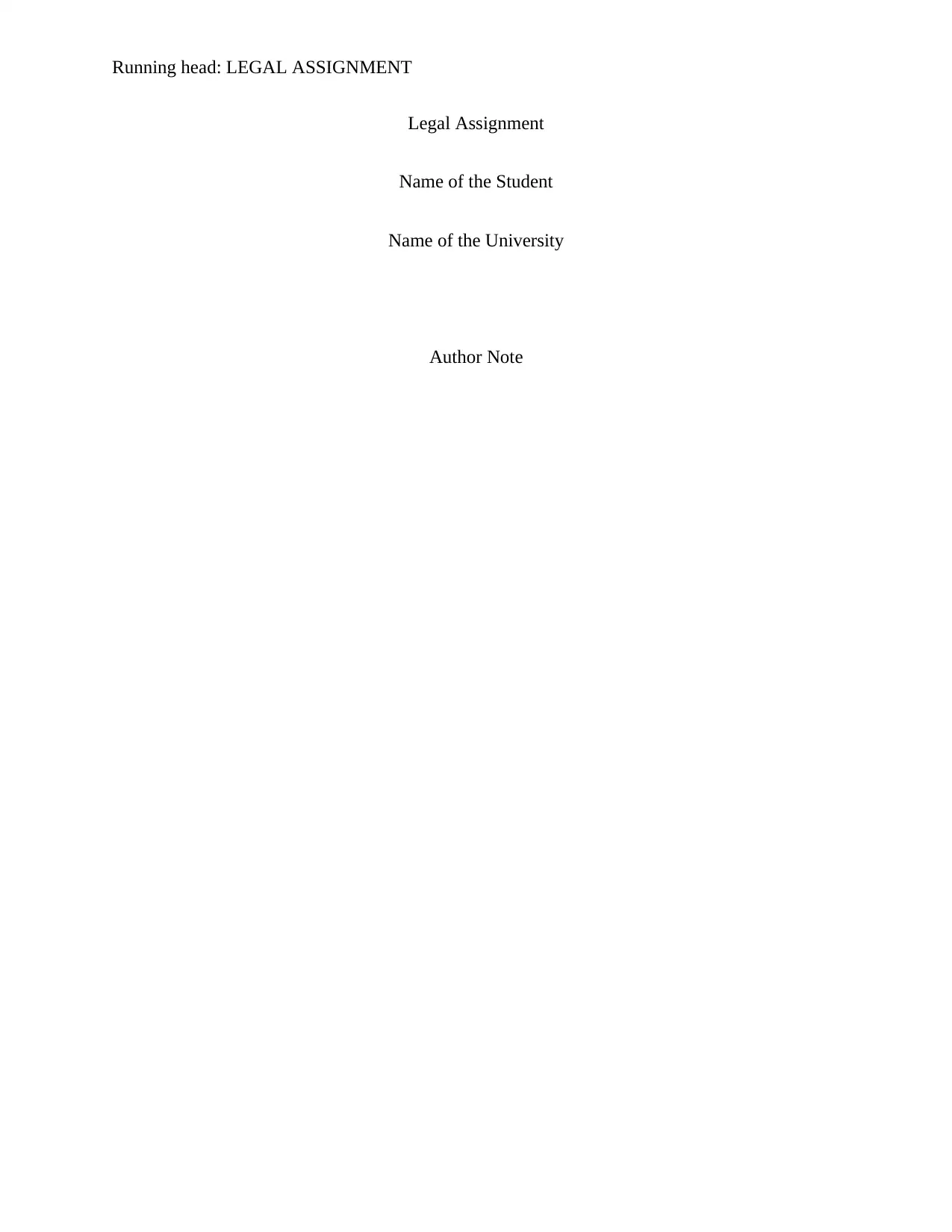
Running head: LEGAL ASSIGNMENT
Legal Assignment
Name of the Student
Name of the University
Author Note
Legal Assignment
Name of the Student
Name of the University
Author Note
Paraphrase This Document
Need a fresh take? Get an instant paraphrase of this document with our AI Paraphraser
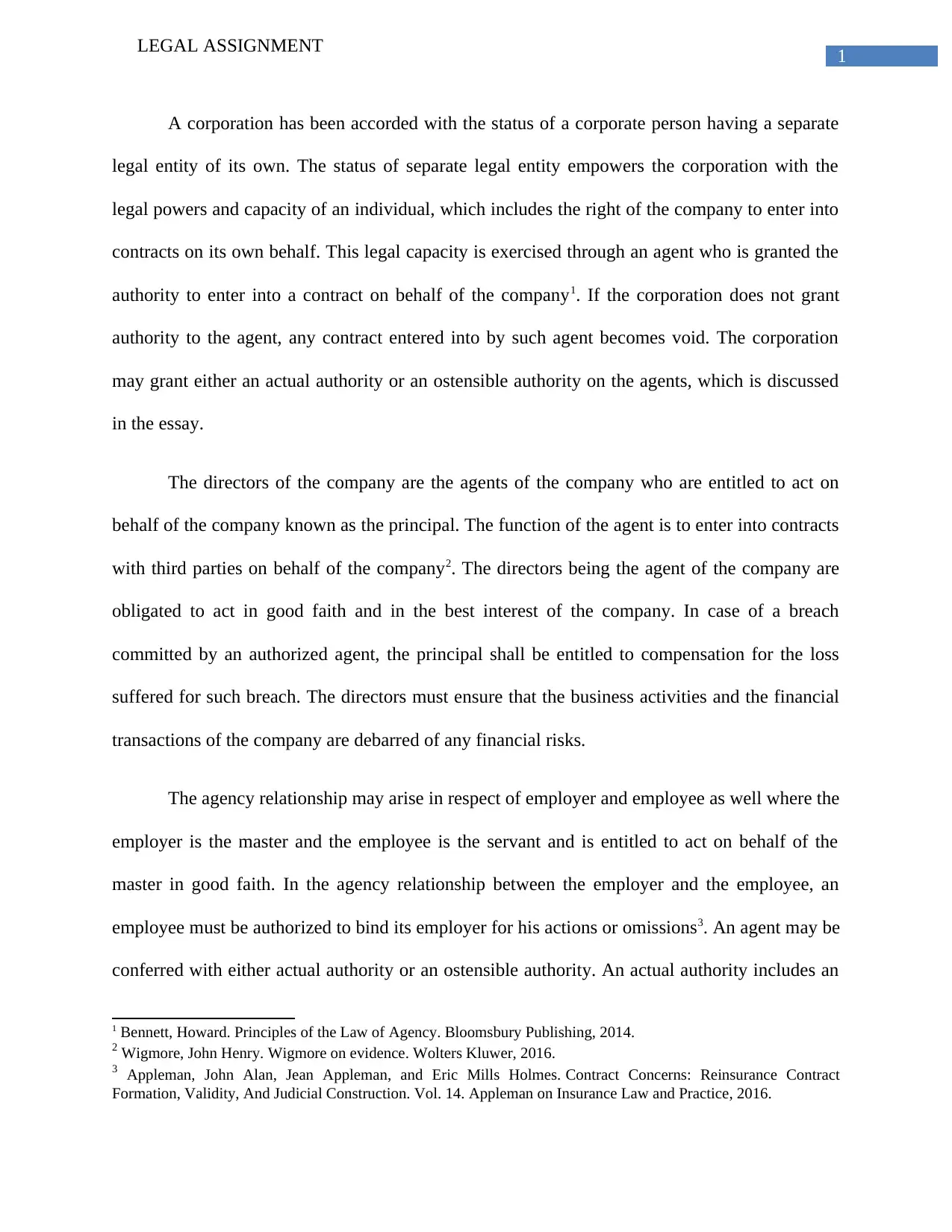
1
LEGAL ASSIGNMENT
A corporation has been accorded with the status of a corporate person having a separate
legal entity of its own. The status of separate legal entity empowers the corporation with the
legal powers and capacity of an individual, which includes the right of the company to enter into
contracts on its own behalf. This legal capacity is exercised through an agent who is granted the
authority to enter into a contract on behalf of the company1. If the corporation does not grant
authority to the agent, any contract entered into by such agent becomes void. The corporation
may grant either an actual authority or an ostensible authority on the agents, which is discussed
in the essay.
The directors of the company are the agents of the company who are entitled to act on
behalf of the company known as the principal. The function of the agent is to enter into contracts
with third parties on behalf of the company2. The directors being the agent of the company are
obligated to act in good faith and in the best interest of the company. In case of a breach
committed by an authorized agent, the principal shall be entitled to compensation for the loss
suffered for such breach. The directors must ensure that the business activities and the financial
transactions of the company are debarred of any financial risks.
The agency relationship may arise in respect of employer and employee as well where the
employer is the master and the employee is the servant and is entitled to act on behalf of the
master in good faith. In the agency relationship between the employer and the employee, an
employee must be authorized to bind its employer for his actions or omissions3. An agent may be
conferred with either actual authority or an ostensible authority. An actual authority includes an
1 Bennett, Howard. Principles of the Law of Agency. Bloomsbury Publishing, 2014.
2 Wigmore, John Henry. Wigmore on evidence. Wolters Kluwer, 2016.
3 Appleman, John Alan, Jean Appleman, and Eric Mills Holmes. Contract Concerns: Reinsurance Contract
Formation, Validity, And Judicial Construction. Vol. 14. Appleman on Insurance Law and Practice, 2016.
LEGAL ASSIGNMENT
A corporation has been accorded with the status of a corporate person having a separate
legal entity of its own. The status of separate legal entity empowers the corporation with the
legal powers and capacity of an individual, which includes the right of the company to enter into
contracts on its own behalf. This legal capacity is exercised through an agent who is granted the
authority to enter into a contract on behalf of the company1. If the corporation does not grant
authority to the agent, any contract entered into by such agent becomes void. The corporation
may grant either an actual authority or an ostensible authority on the agents, which is discussed
in the essay.
The directors of the company are the agents of the company who are entitled to act on
behalf of the company known as the principal. The function of the agent is to enter into contracts
with third parties on behalf of the company2. The directors being the agent of the company are
obligated to act in good faith and in the best interest of the company. In case of a breach
committed by an authorized agent, the principal shall be entitled to compensation for the loss
suffered for such breach. The directors must ensure that the business activities and the financial
transactions of the company are debarred of any financial risks.
The agency relationship may arise in respect of employer and employee as well where the
employer is the master and the employee is the servant and is entitled to act on behalf of the
master in good faith. In the agency relationship between the employer and the employee, an
employee must be authorized to bind its employer for his actions or omissions3. An agent may be
conferred with either actual authority or an ostensible authority. An actual authority includes an
1 Bennett, Howard. Principles of the Law of Agency. Bloomsbury Publishing, 2014.
2 Wigmore, John Henry. Wigmore on evidence. Wolters Kluwer, 2016.
3 Appleman, John Alan, Jean Appleman, and Eric Mills Holmes. Contract Concerns: Reinsurance Contract
Formation, Validity, And Judicial Construction. Vol. 14. Appleman on Insurance Law and Practice, 2016.
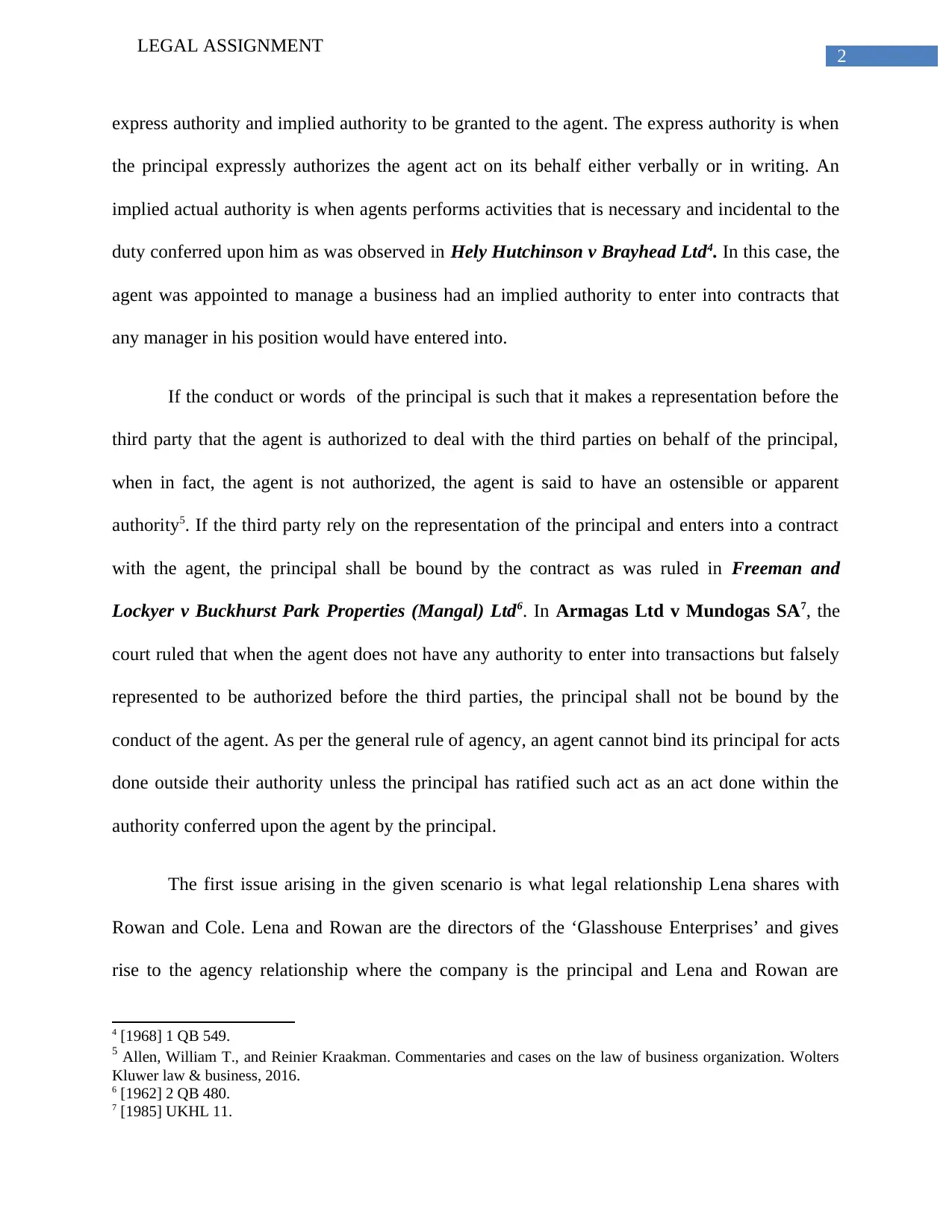
2
LEGAL ASSIGNMENT
express authority and implied authority to be granted to the agent. The express authority is when
the principal expressly authorizes the agent act on its behalf either verbally or in writing. An
implied actual authority is when agents performs activities that is necessary and incidental to the
duty conferred upon him as was observed in Hely Hutchinson v Brayhead Ltd4. In this case, the
agent was appointed to manage a business had an implied authority to enter into contracts that
any manager in his position would have entered into.
If the conduct or words of the principal is such that it makes a representation before the
third party that the agent is authorized to deal with the third parties on behalf of the principal,
when in fact, the agent is not authorized, the agent is said to have an ostensible or apparent
authority5. If the third party rely on the representation of the principal and enters into a contract
with the agent, the principal shall be bound by the contract as was ruled in Freeman and
Lockyer v Buckhurst Park Properties (Mangal) Ltd6. In Armagas Ltd v Mundogas SA7, the
court ruled that when the agent does not have any authority to enter into transactions but falsely
represented to be authorized before the third parties, the principal shall not be bound by the
conduct of the agent. As per the general rule of agency, an agent cannot bind its principal for acts
done outside their authority unless the principal has ratified such act as an act done within the
authority conferred upon the agent by the principal.
The first issue arising in the given scenario is what legal relationship Lena shares with
Rowan and Cole. Lena and Rowan are the directors of the ‘Glasshouse Enterprises’ and gives
rise to the agency relationship where the company is the principal and Lena and Rowan are
4 [1968] 1 QB 549.
5 Allen, William T., and Reinier Kraakman. Commentaries and cases on the law of business organization. Wolters
Kluwer law & business, 2016.
6 [1962] 2 QB 480.
7 [1985] UKHL 11.
LEGAL ASSIGNMENT
express authority and implied authority to be granted to the agent. The express authority is when
the principal expressly authorizes the agent act on its behalf either verbally or in writing. An
implied actual authority is when agents performs activities that is necessary and incidental to the
duty conferred upon him as was observed in Hely Hutchinson v Brayhead Ltd4. In this case, the
agent was appointed to manage a business had an implied authority to enter into contracts that
any manager in his position would have entered into.
If the conduct or words of the principal is such that it makes a representation before the
third party that the agent is authorized to deal with the third parties on behalf of the principal,
when in fact, the agent is not authorized, the agent is said to have an ostensible or apparent
authority5. If the third party rely on the representation of the principal and enters into a contract
with the agent, the principal shall be bound by the contract as was ruled in Freeman and
Lockyer v Buckhurst Park Properties (Mangal) Ltd6. In Armagas Ltd v Mundogas SA7, the
court ruled that when the agent does not have any authority to enter into transactions but falsely
represented to be authorized before the third parties, the principal shall not be bound by the
conduct of the agent. As per the general rule of agency, an agent cannot bind its principal for acts
done outside their authority unless the principal has ratified such act as an act done within the
authority conferred upon the agent by the principal.
The first issue arising in the given scenario is what legal relationship Lena shares with
Rowan and Cole. Lena and Rowan are the directors of the ‘Glasshouse Enterprises’ and gives
rise to the agency relationship where the company is the principal and Lena and Rowan are
4 [1968] 1 QB 549.
5 Allen, William T., and Reinier Kraakman. Commentaries and cases on the law of business organization. Wolters
Kluwer law & business, 2016.
6 [1962] 2 QB 480.
7 [1985] UKHL 11.
⊘ This is a preview!⊘
Do you want full access?
Subscribe today to unlock all pages.

Trusted by 1+ million students worldwide
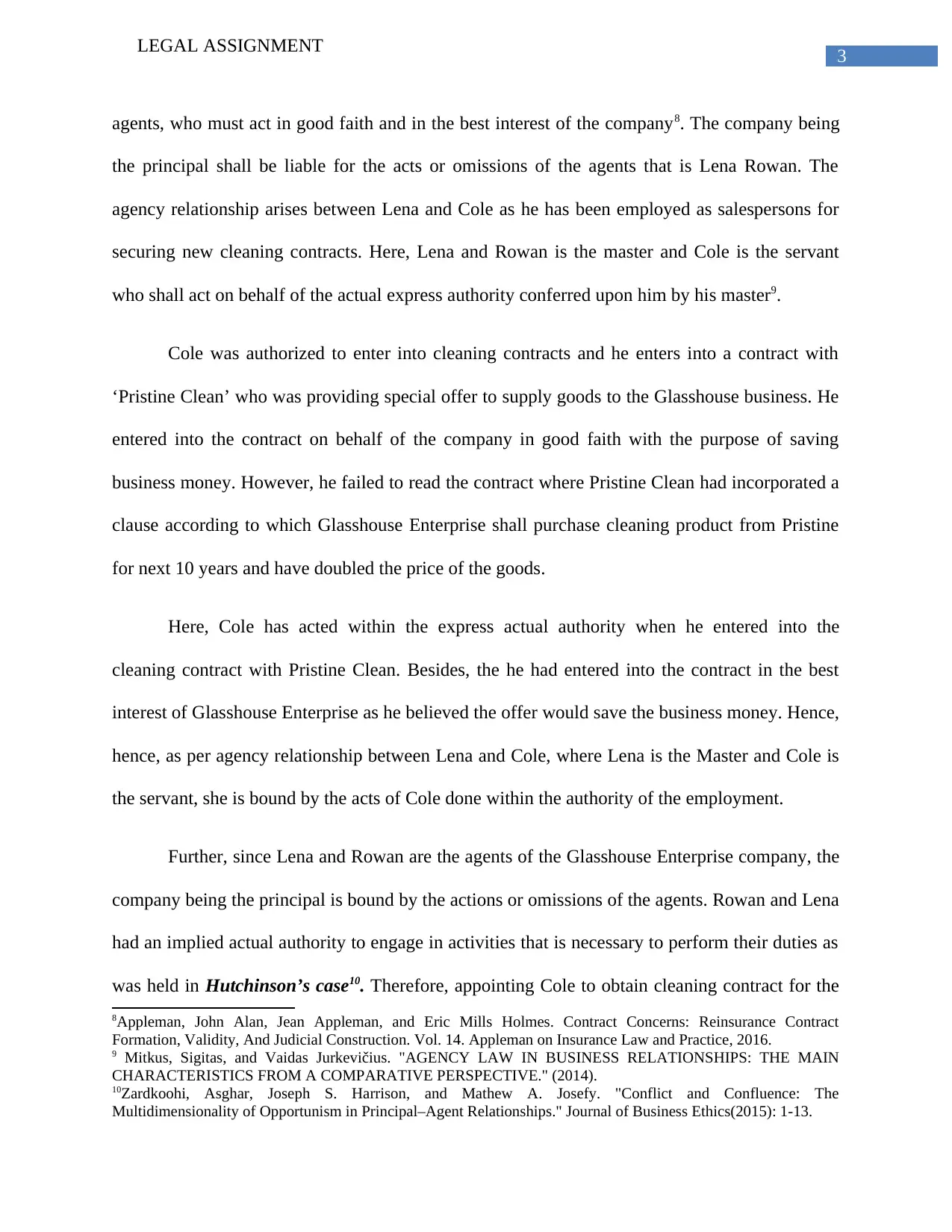
3
LEGAL ASSIGNMENT
agents, who must act in good faith and in the best interest of the company8. The company being
the principal shall be liable for the acts or omissions of the agents that is Lena Rowan. The
agency relationship arises between Lena and Cole as he has been employed as salespersons for
securing new cleaning contracts. Here, Lena and Rowan is the master and Cole is the servant
who shall act on behalf of the actual express authority conferred upon him by his master9.
Cole was authorized to enter into cleaning contracts and he enters into a contract with
‘Pristine Clean’ who was providing special offer to supply goods to the Glasshouse business. He
entered into the contract on behalf of the company in good faith with the purpose of saving
business money. However, he failed to read the contract where Pristine Clean had incorporated a
clause according to which Glasshouse Enterprise shall purchase cleaning product from Pristine
for next 10 years and have doubled the price of the goods.
Here, Cole has acted within the express actual authority when he entered into the
cleaning contract with Pristine Clean. Besides, the he had entered into the contract in the best
interest of Glasshouse Enterprise as he believed the offer would save the business money. Hence,
hence, as per agency relationship between Lena and Cole, where Lena is the Master and Cole is
the servant, she is bound by the acts of Cole done within the authority of the employment.
Further, since Lena and Rowan are the agents of the Glasshouse Enterprise company, the
company being the principal is bound by the actions or omissions of the agents. Rowan and Lena
had an implied actual authority to engage in activities that is necessary to perform their duties as
was held in Hutchinson’s case10. Therefore, appointing Cole to obtain cleaning contract for the
8Appleman, John Alan, Jean Appleman, and Eric Mills Holmes. Contract Concerns: Reinsurance Contract
Formation, Validity, And Judicial Construction. Vol. 14. Appleman on Insurance Law and Practice, 2016.
9 Mitkus, Sigitas, and Vaidas Jurkevičius. "AGENCY LAW IN BUSINESS RELATIONSHIPS: THE MAIN
CHARACTERISTICS FROM A COMPARATIVE PERSPECTIVE." (2014).
10Zardkoohi, Asghar, Joseph S. Harrison, and Mathew A. Josefy. "Conflict and Confluence: The
Multidimensionality of Opportunism in Principal–Agent Relationships." Journal of Business Ethics(2015): 1-13.
LEGAL ASSIGNMENT
agents, who must act in good faith and in the best interest of the company8. The company being
the principal shall be liable for the acts or omissions of the agents that is Lena Rowan. The
agency relationship arises between Lena and Cole as he has been employed as salespersons for
securing new cleaning contracts. Here, Lena and Rowan is the master and Cole is the servant
who shall act on behalf of the actual express authority conferred upon him by his master9.
Cole was authorized to enter into cleaning contracts and he enters into a contract with
‘Pristine Clean’ who was providing special offer to supply goods to the Glasshouse business. He
entered into the contract on behalf of the company in good faith with the purpose of saving
business money. However, he failed to read the contract where Pristine Clean had incorporated a
clause according to which Glasshouse Enterprise shall purchase cleaning product from Pristine
for next 10 years and have doubled the price of the goods.
Here, Cole has acted within the express actual authority when he entered into the
cleaning contract with Pristine Clean. Besides, the he had entered into the contract in the best
interest of Glasshouse Enterprise as he believed the offer would save the business money. Hence,
hence, as per agency relationship between Lena and Cole, where Lena is the Master and Cole is
the servant, she is bound by the acts of Cole done within the authority of the employment.
Further, since Lena and Rowan are the agents of the Glasshouse Enterprise company, the
company being the principal is bound by the actions or omissions of the agents. Rowan and Lena
had an implied actual authority to engage in activities that is necessary to perform their duties as
was held in Hutchinson’s case10. Therefore, appointing Cole to obtain cleaning contract for the
8Appleman, John Alan, Jean Appleman, and Eric Mills Holmes. Contract Concerns: Reinsurance Contract
Formation, Validity, And Judicial Construction. Vol. 14. Appleman on Insurance Law and Practice, 2016.
9 Mitkus, Sigitas, and Vaidas Jurkevičius. "AGENCY LAW IN BUSINESS RELATIONSHIPS: THE MAIN
CHARACTERISTICS FROM A COMPARATIVE PERSPECTIVE." (2014).
10Zardkoohi, Asghar, Joseph S. Harrison, and Mathew A. Josefy. "Conflict and Confluence: The
Multidimensionality of Opportunism in Principal–Agent Relationships." Journal of Business Ethics(2015): 1-13.
Paraphrase This Document
Need a fresh take? Get an instant paraphrase of this document with our AI Paraphraser
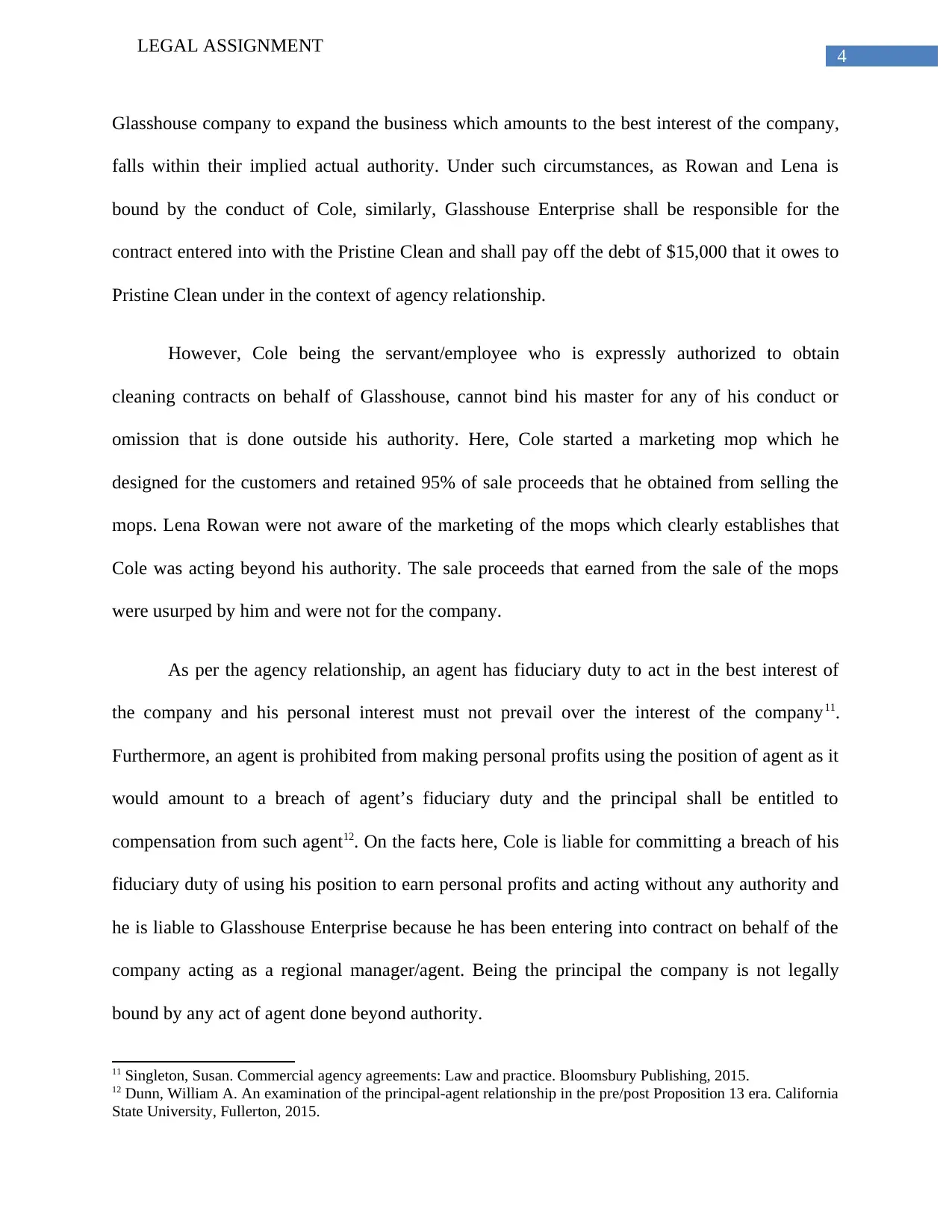
4
LEGAL ASSIGNMENT
Glasshouse company to expand the business which amounts to the best interest of the company,
falls within their implied actual authority. Under such circumstances, as Rowan and Lena is
bound by the conduct of Cole, similarly, Glasshouse Enterprise shall be responsible for the
contract entered into with the Pristine Clean and shall pay off the debt of $15,000 that it owes to
Pristine Clean under in the context of agency relationship.
However, Cole being the servant/employee who is expressly authorized to obtain
cleaning contracts on behalf of Glasshouse, cannot bind his master for any of his conduct or
omission that is done outside his authority. Here, Cole started a marketing mop which he
designed for the customers and retained 95% of sale proceeds that he obtained from selling the
mops. Lena Rowan were not aware of the marketing of the mops which clearly establishes that
Cole was acting beyond his authority. The sale proceeds that earned from the sale of the mops
were usurped by him and were not for the company.
As per the agency relationship, an agent has fiduciary duty to act in the best interest of
the company and his personal interest must not prevail over the interest of the company11.
Furthermore, an agent is prohibited from making personal profits using the position of agent as it
would amount to a breach of agent’s fiduciary duty and the principal shall be entitled to
compensation from such agent12. On the facts here, Cole is liable for committing a breach of his
fiduciary duty of using his position to earn personal profits and acting without any authority and
he is liable to Glasshouse Enterprise because he has been entering into contract on behalf of the
company acting as a regional manager/agent. Being the principal the company is not legally
bound by any act of agent done beyond authority.
11 Singleton, Susan. Commercial agency agreements: Law and practice. Bloomsbury Publishing, 2015.
12 Dunn, William A. An examination of the principal-agent relationship in the pre/post Proposition 13 era. California
State University, Fullerton, 2015.
LEGAL ASSIGNMENT
Glasshouse company to expand the business which amounts to the best interest of the company,
falls within their implied actual authority. Under such circumstances, as Rowan and Lena is
bound by the conduct of Cole, similarly, Glasshouse Enterprise shall be responsible for the
contract entered into with the Pristine Clean and shall pay off the debt of $15,000 that it owes to
Pristine Clean under in the context of agency relationship.
However, Cole being the servant/employee who is expressly authorized to obtain
cleaning contracts on behalf of Glasshouse, cannot bind his master for any of his conduct or
omission that is done outside his authority. Here, Cole started a marketing mop which he
designed for the customers and retained 95% of sale proceeds that he obtained from selling the
mops. Lena Rowan were not aware of the marketing of the mops which clearly establishes that
Cole was acting beyond his authority. The sale proceeds that earned from the sale of the mops
were usurped by him and were not for the company.
As per the agency relationship, an agent has fiduciary duty to act in the best interest of
the company and his personal interest must not prevail over the interest of the company11.
Furthermore, an agent is prohibited from making personal profits using the position of agent as it
would amount to a breach of agent’s fiduciary duty and the principal shall be entitled to
compensation from such agent12. On the facts here, Cole is liable for committing a breach of his
fiduciary duty of using his position to earn personal profits and acting without any authority and
he is liable to Glasshouse Enterprise because he has been entering into contract on behalf of the
company acting as a regional manager/agent. Being the principal the company is not legally
bound by any act of agent done beyond authority.
11 Singleton, Susan. Commercial agency agreements: Law and practice. Bloomsbury Publishing, 2015.
12 Dunn, William A. An examination of the principal-agent relationship in the pre/post Proposition 13 era. California
State University, Fullerton, 2015.

5
LEGAL ASSIGNMENT
LEGAL ASSIGNMENT
⊘ This is a preview!⊘
Do you want full access?
Subscribe today to unlock all pages.

Trusted by 1+ million students worldwide
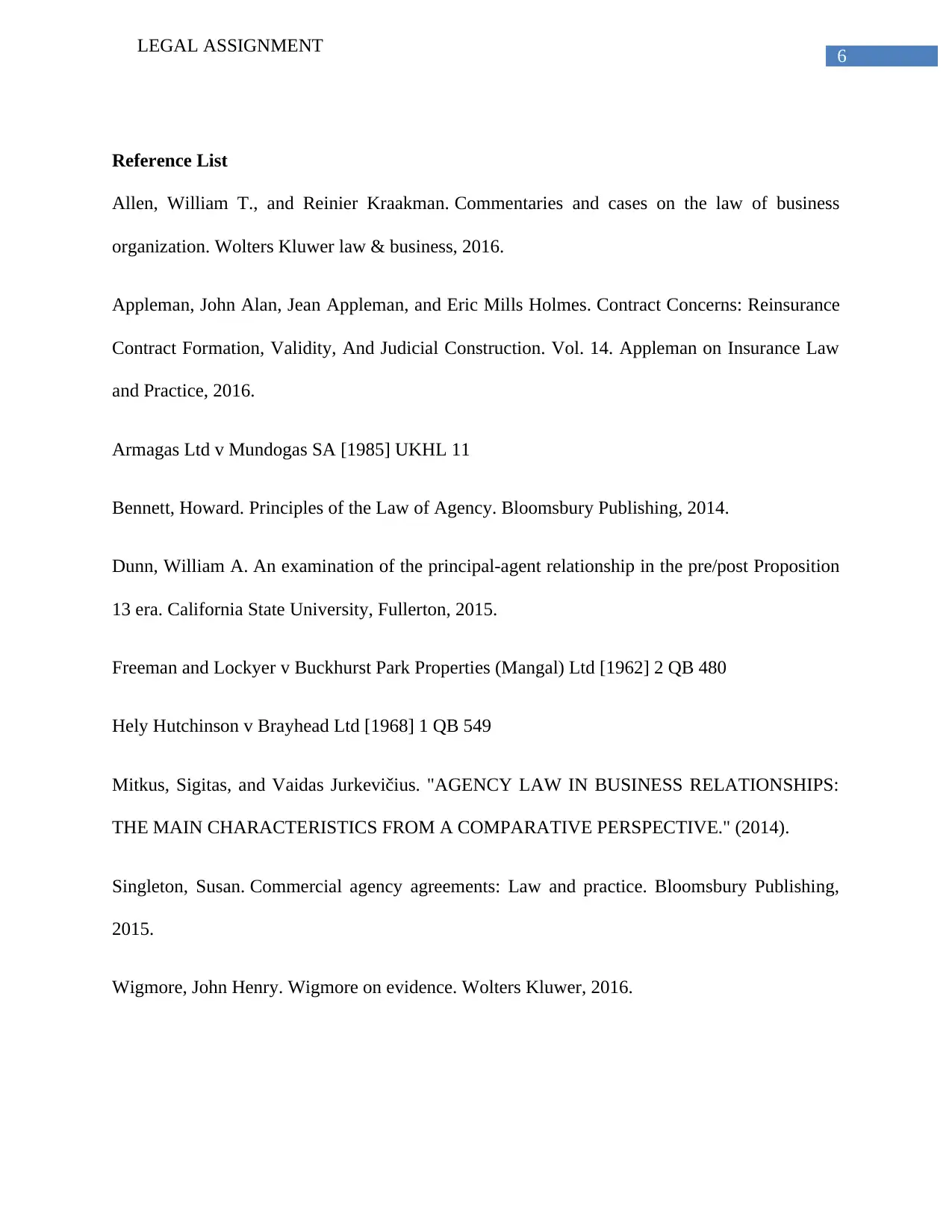
6
LEGAL ASSIGNMENT
Reference List
Allen, William T., and Reinier Kraakman. Commentaries and cases on the law of business
organization. Wolters Kluwer law & business, 2016.
Appleman, John Alan, Jean Appleman, and Eric Mills Holmes. Contract Concerns: Reinsurance
Contract Formation, Validity, And Judicial Construction. Vol. 14. Appleman on Insurance Law
and Practice, 2016.
Armagas Ltd v Mundogas SA [1985] UKHL 11
Bennett, Howard. Principles of the Law of Agency. Bloomsbury Publishing, 2014.
Dunn, William A. An examination of the principal-agent relationship in the pre/post Proposition
13 era. California State University, Fullerton, 2015.
Freeman and Lockyer v Buckhurst Park Properties (Mangal) Ltd [1962] 2 QB 480
Hely Hutchinson v Brayhead Ltd [1968] 1 QB 549
Mitkus, Sigitas, and Vaidas Jurkevičius. "AGENCY LAW IN BUSINESS RELATIONSHIPS:
THE MAIN CHARACTERISTICS FROM A COMPARATIVE PERSPECTIVE." (2014).
Singleton, Susan. Commercial agency agreements: Law and practice. Bloomsbury Publishing,
2015.
Wigmore, John Henry. Wigmore on evidence. Wolters Kluwer, 2016.
LEGAL ASSIGNMENT
Reference List
Allen, William T., and Reinier Kraakman. Commentaries and cases on the law of business
organization. Wolters Kluwer law & business, 2016.
Appleman, John Alan, Jean Appleman, and Eric Mills Holmes. Contract Concerns: Reinsurance
Contract Formation, Validity, And Judicial Construction. Vol. 14. Appleman on Insurance Law
and Practice, 2016.
Armagas Ltd v Mundogas SA [1985] UKHL 11
Bennett, Howard. Principles of the Law of Agency. Bloomsbury Publishing, 2014.
Dunn, William A. An examination of the principal-agent relationship in the pre/post Proposition
13 era. California State University, Fullerton, 2015.
Freeman and Lockyer v Buckhurst Park Properties (Mangal) Ltd [1962] 2 QB 480
Hely Hutchinson v Brayhead Ltd [1968] 1 QB 549
Mitkus, Sigitas, and Vaidas Jurkevičius. "AGENCY LAW IN BUSINESS RELATIONSHIPS:
THE MAIN CHARACTERISTICS FROM A COMPARATIVE PERSPECTIVE." (2014).
Singleton, Susan. Commercial agency agreements: Law and practice. Bloomsbury Publishing,
2015.
Wigmore, John Henry. Wigmore on evidence. Wolters Kluwer, 2016.
Paraphrase This Document
Need a fresh take? Get an instant paraphrase of this document with our AI Paraphraser
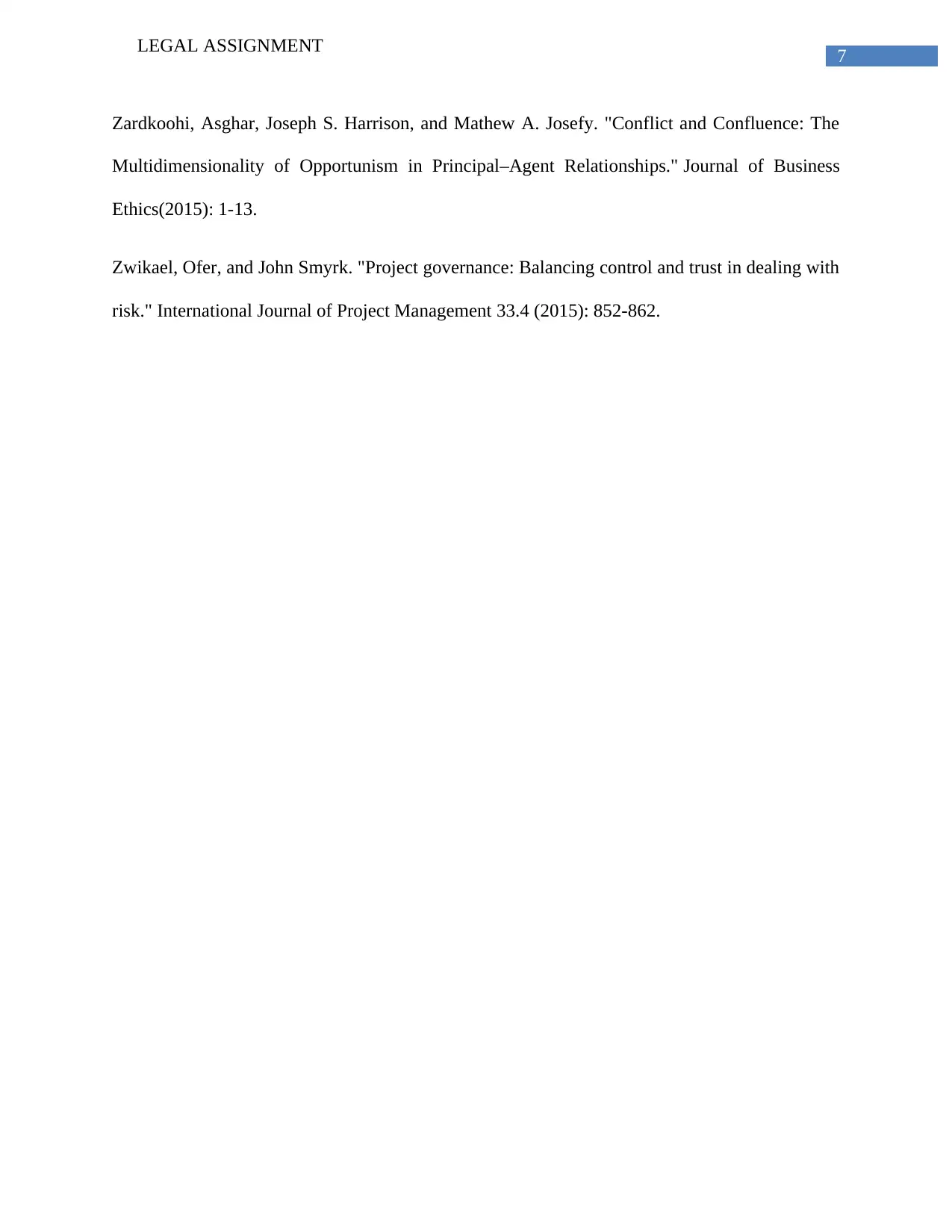
7
LEGAL ASSIGNMENT
Zardkoohi, Asghar, Joseph S. Harrison, and Mathew A. Josefy. "Conflict and Confluence: The
Multidimensionality of Opportunism in Principal–Agent Relationships." Journal of Business
Ethics(2015): 1-13.
Zwikael, Ofer, and John Smyrk. "Project governance: Balancing control and trust in dealing with
risk." International Journal of Project Management 33.4 (2015): 852-862.
LEGAL ASSIGNMENT
Zardkoohi, Asghar, Joseph S. Harrison, and Mathew A. Josefy. "Conflict and Confluence: The
Multidimensionality of Opportunism in Principal–Agent Relationships." Journal of Business
Ethics(2015): 1-13.
Zwikael, Ofer, and John Smyrk. "Project governance: Balancing control and trust in dealing with
risk." International Journal of Project Management 33.4 (2015): 852-862.
1 out of 8
Related Documents
Your All-in-One AI-Powered Toolkit for Academic Success.
+13062052269
info@desklib.com
Available 24*7 on WhatsApp / Email
![[object Object]](/_next/static/media/star-bottom.7253800d.svg)
Unlock your academic potential
Copyright © 2020–2026 A2Z Services. All Rights Reserved. Developed and managed by ZUCOL.





